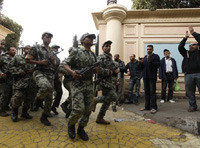Egypt's future: War with Israel
 Recent developments in Egypt clearly indicate that Mubarak has effectively lost control over the situation in the country. The police were unable to control people's anger and simply fled. Introduction of curfews and bringing the army into the streets did not work either. The army has virtually split. In the best for Mubarak case, the military take a neutral position, at worst they make friends with the people.
Recent developments in Egypt clearly indicate that Mubarak has effectively lost control over the situation in the country. The police were unable to control people's anger and simply fled. Introduction of curfews and bringing the army into the streets did not work either. The army has virtually split. In the best for Mubarak case, the military take a neutral position, at worst they make friends with the people.
The latter was a particularly unpleasant discovery for the head of the state. Coming from the military background, he was convinced that the military would support him. In the past Mubarak headed the Egyptian air force and used to personally fly to attack the positions of Israeli troops. In addition, before bringing the military into the streets to fight the demonstrators, Mubarak generously gave them money. Yet, this has not made them more willing to shoot at their brothers and fathers who are protesting against corruption and poverty.
The position of the current Egyptian President is worsened by the fact that all the opposition forces - the Islamists, leftists, and democrats - are united against him. There is also a respected authority claiming the power in the country - the former head of the IAEA Mohamed ElBaradei.
One of the major mistakes of the current Egyptian President was that he was afraid of competition with moderate Islamists, and in the elections in the end of 2010 simply did not let the "Muslim Brotherhood" into the Parliament. Earlier, when they were sitting there delineating responsibilities for making certain decisions with the "party of power," the radicals were not to be afraid of. Emerging contradictions were resolved one way or the other.
Yet, now the Islamists have nowhere to retreat, the more so because the situation is not in favor of Mubarak. Given that 40 percent of Egypt's population is poor (with a monthly income less than 50 dollars a month), the opposition is supported by tens of millions of Egyptians.
Finally, the last blow was struck by the West. Many European and American leaders virtually took the side of the opposition. Mubarak was criticized for excessive use of force and pointed to the need for democratic reforms in the country.
In essence, what we are witnessing now can be described as a collapse of the government. This is confirmed by the fact that Mubarak has decided to replace the cabinet. The opposition sees this as a sign of weakness and at the same time as a strategic trick whose goal is to let people blow off steam and stay in power until the fall when the next election is scheduled. However, even if Mubarak somehow miraculously manages to stay in power, it is clear that the operation "Successor" has already failed.
Hosni Mubarak's age does not play is his favor either. It is no secret that even in the best case scenario he does not have much time left. Few people are willing to dance to the tune of his non-authoritative and politically weak son Gamal.
Meanwhile, there are fears that the fall of Mubarak's regime would lead to chaos in the country. So far the opposition is united under the banner "overthrow Hosni and then we'll see." Further down the road there will be initially insoluble conflict between Islamists and liberals, Muslims and Christians, and finally, among Islamists who are divided into moderates and radicals. In addition, the army also has its ambitions for power.
In the short term the fall of Mubarak will cause a chain reaction and lead to the collapse of secular and monarchical regimes in other countries in the region, especially in Yemen. Jordan, Syria, and Algeria are among other candidates for the implementation of the domino effect.
Most importantly, the change of power in Egypt will radically change the balance of power in the region. It is worth mentioning that Israel remains the only country that continues to strongly support the Mubarak regime. Tel Aviv is easy to understand: the current President is the guarantor of friendly neutrality of Egypt. This country with the largest in the Arab world people resources is involved in every Arab-Israeli war. However, now Egypt's foreign policy orientation may change dramatically.
This has nothing to do with the classic anti-Israel stance of the Muslim Brotherhood, who after the current events will dramatically increase its influence in the country. The matter is that the only way for Egypt's future will be the external expansion. In fact, it is programmed by the current demographics of the country. Over the past quarter century, the country's population has doubled, and it continues to grow exponentially.
According to the most conservative estimate, the current Egyptian population that, according to unofficial data, is now at 90 million will grow by two million annually.
Whoever comes to power in the country will not be able to solve the issue of the progressive poverty. This creates long-term instability of the Egyptian authorities.
Inevitably, the power will be taken by the radical Islamists whose ideas are finding a greater understanding among youth. The gist of the concept is simple: "We live so poorly because we have forgotten about the real Islam." Yet, the establishment of Sharia law will not be a way out from the disastrous economic situation.
There is only one way out - a war. To divert people's discontent from the authorities, it has to be directed at an external enemy - the Zionists, who, according to the ideas of the Islamists, want no more than harming Arabs and Muslims. Israel is traditionally considered to be an enemy, and should be preparing for the worst.
Sergei Balmasov
Pravda.Ru
Subscribe to Pravda.Ru Telegram channel, Facebook, RSS!





